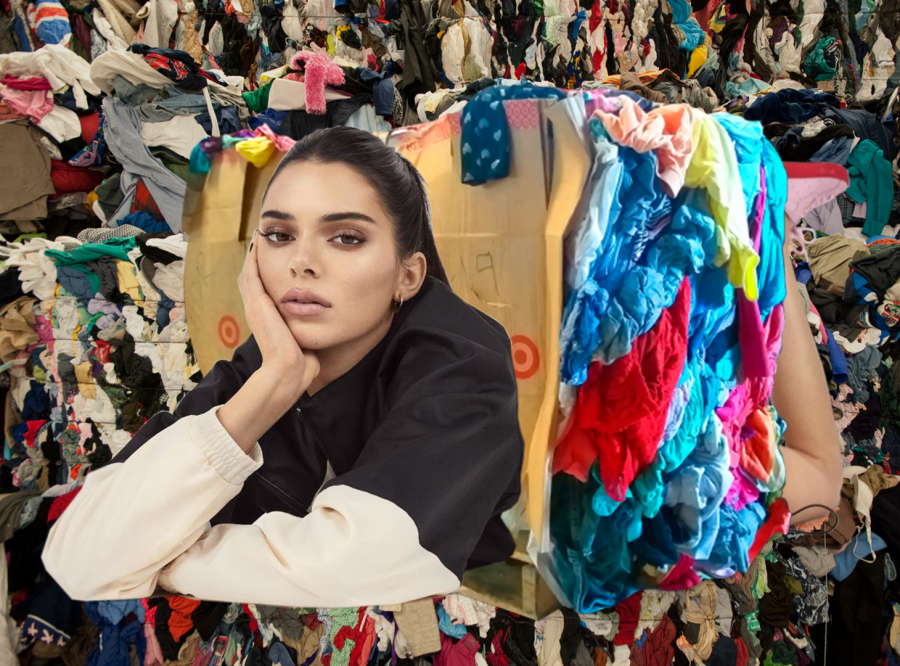The Promotion of Fast Fashion from Influencers Is Problematic and Unsustainable
(Graphic by Cyan Larson | The Daily Utah Chronicle)
June 18, 2021
Fashion social media influencers, from platforms like Instagram and TikTok, use their status to push followers to a culture of fast fashion, moving people away from sustainability in their purchases. It is a damaging practice that preys on our want of instant gratification and negatively impacts the environment.
Fast vs. Slow Fashion
When manufacturers mass-produce the trendiest pieces and sell to vendors for lower prices, they are taking advantage of what’s current in fashion to make quick money. This practice, known as fast fashion, costs employees fair pay and produces negative environmental outcomes through selling unethically produced and low-quality clothing. One major cause of pollution in the world is the high quantity of these poorly made clothes — landfills and garbage sites are covered in torn, tattered garments made from cheap dyes at the hands of workers who don’t get paid living wages for their labor.
To stop the pollution and exploitation created by fast fashion, brands and clothing departments need to reach sustainability. Prioritizing quality over quantity of clothing items is a cultural idea that people need to adopt if they want to stall the progression of the climate crisis.
This means keeping clothes for as long as possible, taking care of each piece, buying less and being a smarter product-consumer. This method, called slow fashion, is a more earth-friendly approach to wearing clothing and gives the mentality that fashion is about versatility, not the social internet’s latest craze.
Clothing Culture
Social media influencers have control over their masses of followers in ways that we don’t yet know the extent of. Whether it’s purchasing clothing online or seeing an ad for a store, when your favorite influencer is promoting a product, it convinces you to want it.
Buzz created from a viral TikTok can make its way through millions of phones, which encourages fashion trends to take shape rapidly and almost subconsciously. One major factor at play in both fast fashion and social media is instant gratification. Influencers receive feedback and money from social media interaction, while those followers get satisfaction from owning what’s considered popular.
The instant gratification of fast fashion is dangerous to the environment and the way clothes are worn and treated. Not only does the production, manufacturing and transport for fast fashion cause greenhouse gases to be created, it involves a large amount of waste byproducts.
In a New York Times article called “How Fast Fashion Is Destroying the Planet,” writer Tatiana Schlossberg said, “More than 60 percent of fabric fibers are now synthetics, derived from fossil fuels, so if and when our clothing ends up in a landfill (about 85 percent of textile waste in the United States goes to landfills or is incinerated), it will not decay.” It’s not just a matter of production costs, as fashion increases carbon emissions and water usage, but how our waste habits damage ecosystems.
Human Impact
The validation that influencers receive from likes and comments reflects on their viewers and triggers similar behavior. This hurts our wallets and perceptions of wearing fashion, alluding to the belief that having more clothing equates to having better style. An endless cycle continues, as big shopping hauls of cheap fashion lead to poor conditions for laborers and strain on resources. The time has come for sustainability and slow fashion to rise as the majority practice.
As a consumer, don’t fall victim to inexpensive runway looks to buy more for your buck. Of course, nobody is perfect, and neither is every brand that promotes sustainability in its production. Still, for the sake of society as a whole, people need to adapt to a different mindset of understanding the importance fashion plays in our lives.
Whether you love or hate fashion as a concept, everyone wears clothes and participates in the industry, which is designed to produce what’s in demand and what’s in style. It’s a domino effect — as sustainability in fashion production becomes higher in demand, it becomes the new normal. This puts the responsibility on consumers to shop smart. Fashion can then mean more than simple trends, but as something that lasts.










sirina • Dec 18, 2021 at 2:58 am
Very well written!!